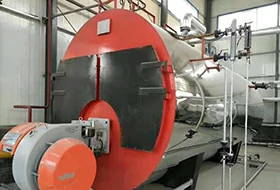
Aug . 31, 2024 00:11 Back to list
hot water boiler definition
Understanding Hot Water Boilers Definition and Function
Hot water boilers are essential components in various heating systems, particularly in residential, commercial, and industrial applications. At its core, a hot water boiler is a device designed to heat water for residential or commercial spaces through controlled combustion. This article delves into the definition of hot water boilers, their operation, applications, and importance in modern heating solutions.
A hot water boiler can be defined as a closed vessel in which water is heated to generate hot water or steam. Heat is generated through the combustion of fuel sources such as natural gas, propane, oil, or biomass, depending on the design and application of the boiler. Once heated, the hot water is circulated through pipes to radiators or underfloor heating systems, providing warmth and comfort to spaces that require temperature regulation.
The operation of a hot water boiler is quite straightforward. The process begins when the thermostat detects a drop in temperature within the heating area. This triggers the boiler's ignition system, causing the burner to activate and combustion to occur. As fuel burns, it releases heat energy, which is transferred to the water within the boiler. The heated water or steam is then pushed out through a system of pipes, effectively distributing warmth throughout the building.
Hot water boilers come in various types, each suited for particular applications
. The most common types include1. Fire-Tube Boilers In these systems, hot gases from the burner pass through tubes submerged in water. Heat exchange occurs as the combustion gases heat up the water surrounding the tubes, which is then circulated for heating.
hot water boiler definition

2. Water-Tube Boilers In contrast, these boilers circulate water through tubes that are heated by combustion gases. Water-tube boilers are more efficient and can handle higher pressures, making them suitable for industrial applications.
3. Combination Boilers These versatile systems provide both heating and hot water on demand, making them ideal for homes and small businesses. They can offer an efficient space-saving solution.
Hot water boilers play a vital role in various settings. In residential homes, they ensure a warm and comfortable environment during cold seasons. Commercially, they are used in facilities such as hotels, hospitals, and schools, where a steady supply of hot water is essential for both heating and sanitation. In industrial settings, hot water boilers are used in processes that require high-temperature water, including manufacturing and food processing.
The importance of maintaining hot water boilers cannot be overstated. Regular maintenance ensures optimal performance, increases efficiency, and prolongs the lifespan of the system. This can include routine inspections, cleaning, and prompt repairs to prevent malfunctions. Additionally, energy-efficient designs and technologies are increasingly being integrated into modern hot water boilers, reducing environmental impact and operating costs.
In conclusion, hot water boilers are critical fixtures in the heating landscape, providing comfort and essential services across various applications. Understanding their definition, operation, and importance underscores their vital role in both residential and commercial settings. As technology continues to advance, hot water boilers are becoming even more efficient, paving the way for sustainable heating solutions that ensure comfort without compromising environmental responsibility.
-
High-Efficiency Commercial Oil Fired Steam Boiler for Industry
NewsJul.30,2025
-
High-Efficiency Biomass Fired Thermal Oil Boiler Solutions
NewsJul.30,2025
-
High Efficiency Gas Fired Thermal Oil Boiler for Industrial Heating
NewsJul.29,2025
-
High-Efficiency Gas Fired Hot Water Boiler for Sale – Reliable & Affordable
NewsJul.29,2025
-
High Efficiency Biomass Fired Hot Water Boiler for Industrial and Commercial Use
NewsJul.29,2025
-
High-Efficiency Biomass Fired Hot Water Boiler for Industrial Use
NewsJul.28,2025
Related PRODUCTS






















